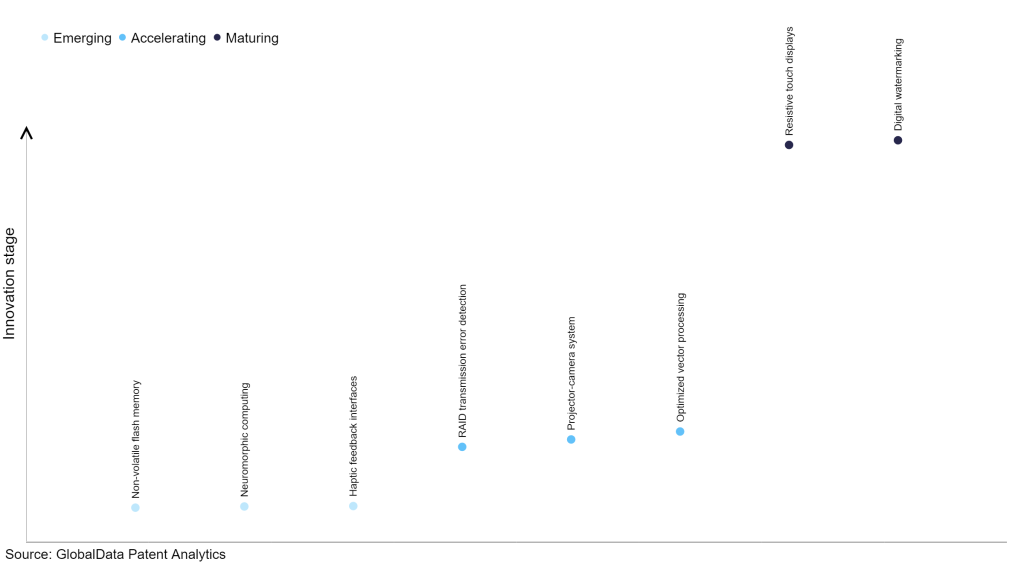The technology industry continues to be a hotbed of patent innovation. Activity is driven by the increasing demand for high-performance computing tasks in fields like scientific simulations, artificial intelligence, and data analytics, and growing importance of technologies such as advanced processor architectures, specialized vector instruction sets, and compiler optimizations, enabling faster and more energy-efficient execution of complex mathematical operations, leading to substantial improvements in computational efficiency and application performance. In the last three years alone, there have been over 1.5 million patents filed and granted in the technology industry, according to GlobalData’s report on Innovation in technology: optimized vector processing. Buy the report here.

Access deeper industry intelligence
Experience unmatched clarity with a single platform that combines unique data, AI, and human expertise.
However, not all innovations are equal and nor do they follow a constant upward trend. Instead, their evolution takes the form of an S-shaped curve that reflects their typical lifecycle from early emergence to accelerating adoption, before finally stabilizing and reaching maturity.
Identifying where a particular innovation is on this journey, especially those that are in the emerging and accelerating stages, is essential for understanding their current level of adoption and the likely future trajectory and impact they will have.
185+ innovations will shape the technology industry
According to GlobalData’s Technology Foresights, which plots the S-curve for the technology industry using innovation intensity models built on over 1.6 million patents, there are 185+ innovation areas that will shape the future of the industry.
Within the emerging innovation stage, non-volatile flash memory, neuromorphic computing, and haptic feedback interfaces are disruptive technologies that are in the early stages of application and should be tracked closely. RAID transmission error detection, projector-camera system, and optimized vector processing are some of the accelerating innovation areas, where adoption has been steadily increasing. Among maturing innovation areas are resistive touch displays and digital watermarking, which are now well established in the industry.
Innovation S-curve for the technology industry

Optimized vector processing is a key innovation area in technology
Optimized vector processing encompasses the streamlined execution of vector-based instructions within computer systems. This involves employing methods and circuits to refine the handling of vectorized data, leading to benefits like heightened speed, diminished power consumption, and overall enhanced performance.
GlobalData’s analysis also uncovers the companies at the forefront of each innovation area and assesses the potential reach and impact of their patenting activity across different applications and geographies. According to GlobalData, there are 80 companies, spanning technology vendors, established technology companies, and up-and-coming start-ups engaged in the development and application of optimized vector processing.
Key players in optimized vector processing – a disruptive innovation in the technology industry
‘Application diversity’ measures the number of applications identified for each patent. It broadly splits companies into either ‘niche’ or ‘diversified’ innovators.
‘Geographic reach’ refers to the number of countries each patent is registered in. It reflects the breadth of geographic application intended, ranging from ‘global’ to ‘local’.
Among the companies innovating in optimized vector processing, Intel is the leading patents filers. The company’s patent describes a specific embodiment, a processor consisting of an instruction decoder responsible for interpreting a key instruction for gathering data elements from memory. This instruction includes a first parameter designating an initial storage location and a second parameter indicating a memory address holding multiple data elements. Furthermore, the processor integrates an execution unit connected to the instruction decoder. Upon receiving the initial instruction, the execution unit extracts contiguous first and second data elements from a memory location based on the memory address specified in the second parameter. Subsequently, it places the first data element in the initial entry of the first storage location, and the second data element in the secondary entry of a distinct storage location corresponding to the initial entry of the first storage location. Other prominent patent filers in the space include SoftBank Group and Texas Instruments.
In terms of application diversity, Intel leads the pack, while Bright Data and VMware stood in second and third positions, respectively. By means of geographic reach, Bright Data held the top position, followed by Intel and Bracket Computing.
Optimized vector processing is instrumental in enhancing the computational efficiency of systems by enabling them to efficiently handle large datasets through specialized instructions. This technology significantly accelerates tasks like scientific simulations, multimedia processing, and data analytics, leading to faster and more powerful computing capabilities.
To further understand the key themes and technologies disrupting the technology industry, access GlobalData’s latest thematic research report on Technology.
Data Insights
From

The gold standard of business intelligence.
Blending expert knowledge with cutting-edge technology, GlobalData’s unrivalled proprietary data will enable you to decode what’s happening in your market. You can make better informed decisions and gain a future-proof advantage over your competitors.







